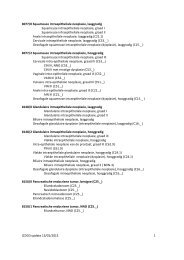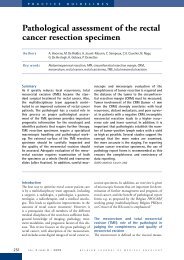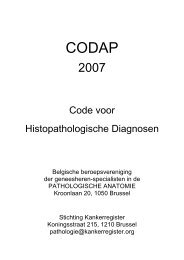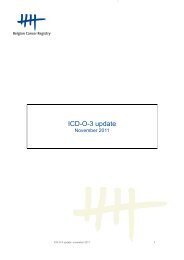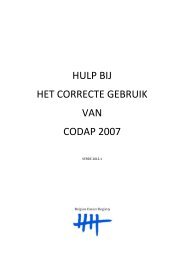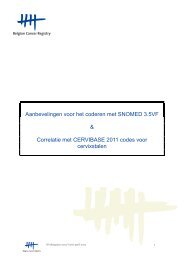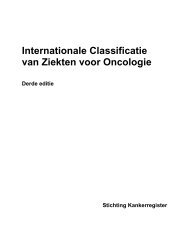Assurance de qualité pour le cancer rectal – phase 2 ...
Assurance de qualité pour le cancer rectal – phase 2 ...
Assurance de qualité pour le cancer rectal – phase 2 ...
Create successful ePaper yourself
Turn your PDF publications into a flip-book with our unique Google optimized e-Paper software.
78 PROCARE <strong>–</strong> <strong>phase</strong> 2 KCE reports 814.3.2.4 SpainAlso, an attempt is ma<strong>de</strong> to extend the dataset to incorporate extra information onother aspects of care by linking it to other routine data sources, such as radiotherapy,chemotherapy and pathology databases. However, variab<strong>le</strong> amounts of information onthese aspects of care are availab<strong>le</strong> across the country.The National Bowel Cancer Audit Project (NBOCAP) is a collaboration between theAssociation of Coloproctologists of Great Britain and Ireland (ACPGBI) and theNational Clinical Audit Support Programme (NCASP). It is a voluntary audit andmembers of the ACPGBI can submit information about their patients to it. It is notpopulation-based and only covers about one third of the colo<strong>rectal</strong> <strong>cancer</strong> patients atmost. The NBOCAP dataset has more <strong>de</strong>tai<strong>le</strong>d clinical information than the PROCAREdatabase (e.g. ASA gra<strong>de</strong>), but unfortunately <strong>–</strong> as it is a voluntary audit <strong>–</strong> it is often veryincomp<strong>le</strong>te and many key fields are missing. When comparing their data to thepopulation-based data at NYCRIS, it was found that members of the ACPGBI havesignificantly better outcomes than non-members. Therefore, using NBOCAP data as aproxy for national work may be biased as it overestimates outcomes. NYCRIS is verykeen, however, to link its data to the NBOCAP data as this would supp<strong>le</strong>ment thedataset with more clinical information and it would give them national coverage. Theyare actively trying to collaborate with NBOCAP to achieve this.NYCRIS is also interested to collaborate with col<strong>le</strong>agues in Dutch <strong>cancer</strong> registries, andthey suggested that a Belgian dimension could be of interest (personal communicationwith David Forman).The Spanish registry has recently been set up by professionals and the Spanish surgicalsociety. Participation is on a voluntary basis. Unfortunately, resources are lacking to payfor a data manager travelling around Spain.The database was based on an agreement between surgeons, pathologists, radiologistsand oncologists. Unfortunately, data concerning adverse effects or the use of new drugcombinations are incomp<strong>le</strong>te.No unequivocal mechanism is availab<strong>le</strong> to check whether all participatingteams/hospitals submit their consecutive patients for registration. Hospitals willing to beinclu<strong>de</strong>d have to comp<strong>le</strong>te a questionnaire, which inclu<strong>de</strong>s two questions about theannual case load (number of cases treated in the last 5 years, number of cases treated inthe last year). If the number of observed cases from a hospital is <strong>le</strong>ss than 5% of theexpected cases, all data of this hospital are exclu<strong>de</strong>d from the registry for that particularyear.4.3.2.5 GermanyThe population-based <strong>cancer</strong> registry Bavaria is one of the 10 regional <strong>cancer</strong> registriesin Germany (http://www.ekr.med.uni-erlangen.<strong>de</strong>/GEKID/Doc/kid2006_english.pdf). It isa classical epi<strong>de</strong>miologic <strong>cancer</strong> registry that does not provi<strong>de</strong> data for benchmarking(except for non-adjusted overall survival).4.3.2.6 NorwayThe Norwegian <strong>rectal</strong> <strong>cancer</strong> registry has more or <strong>le</strong>ss "automatic" merges with thenational cause of <strong>de</strong>ath registry and all EPJ systems in Norway.4.4 DISCUSSIONA nationwi<strong>de</strong> population-based database on <strong>rectal</strong> <strong>cancer</strong> has been instal<strong>le</strong>d and isfunctioning in Swe<strong>de</strong>n, Norway, Denmark, and the UK. Participation in these registriesis compulsory. In the Netherlands, a similar database was instal<strong>le</strong>d only very recently(January 2008). On the other hand, regional population-based databases on patientswith <strong>rectal</strong> <strong>cancer</strong>, with participation on a voluntary basis, are availab<strong>le</strong> in France,Germany, and the Netherlands.Most of these databases are located in a scientific organisation, supported by theclinicians and financially supported by the government (at <strong>le</strong>ast in Swe<strong>de</strong>n and the UK).



